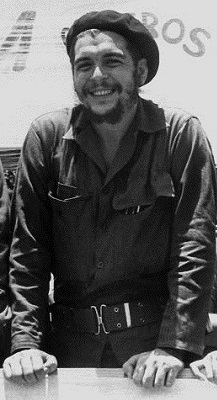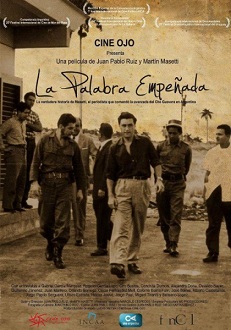|
~ Ernesto Che Guevara
~ Galéria
~ Oldal
~ Bejelentkezés
~ Vissza a Főoldalra
Ernesto Che Guevara, az argentin származású forradalmár, miniszter, gerillavezér és író, Buenos Aires-ben szerzett orvosi diplomát, majd a kubai forradalom során jelentős szerepet játszott a szigetország felszabadításában és újjáépítésében. A kubai gazdaság talpraállításáért dolgozott, küzdött az oktatás és az egészségügy fejlesztéséért, az írástudatlanság és a faji előítéletek felszámolásáért. Saját példájával népszerűsítette az önkéntes munkát. Kongóban és Bolíviában is harcolt - harminckilenc éves volt, amikor az amerikai-bolíviai csapatok csapdába ejtették és kivégezték.
| | |
|

| | |
|
|
|
La palabra empeñada
|
|
|
 La palabra empeñada is a documentary film, released in 2010. La palabra empeñada is a documentary film, released in 2010.
It shows the life of the famous Argentinian journalist and guerrilla, Jorge Ricardo Masetti through archive footage and interviews with people who knew him well like his friend, the Nobel-awarded writer, Gabriel García Márquez, the historian Osvaldo Bayer, the journalist Rogelio García Lupo and Conchita Dumois, who was his secretary and his second wife.
Masetti went to the Sierra Maestra in 1958 to make an interview with Fidel Castro and Che Guevara. He became a close friend of Che, they founded the Prensa Latina, the Latin American news agency and they prepared a guerrilla campaign (Ejército Guerrillero del Pueblo (EGP) in Argentina. Masetti led the campaign under the name El Comandante Segundo (The second commander) and he disappeared in the Argentinian jungle in 1964 after the EGP failed.
The film was shot in Cuba and the Northeast Argentina.
[Watch La palabra empeñada]
[Read the interview with Juan Pablo Ruiz - in Spanish]
|
|
|


| | |
|
|
|
~ Ernesto Che Guevara
~ Gallery
~ Site
~ Log in
~ Back to the Main page
Ernesto Che Guevara, the Argentine-born revolutionary, minister, guerrilla leader and writer, received his medical degree in Buenos Aires, then played an essential part in the Cuban Revolution in liberating and rebuilding the country. He did his best to set up the Cuban economy, fought for the improvement of the education and the health system, the elimination of illiteracy and racial prejudice. He promoted voluntary work by his own example. He fought in the Congo and in Bolivia - he was thirty-nine years old, when he was trapped and executed by the joint American-Bolivian forces.
| | |
|
|

